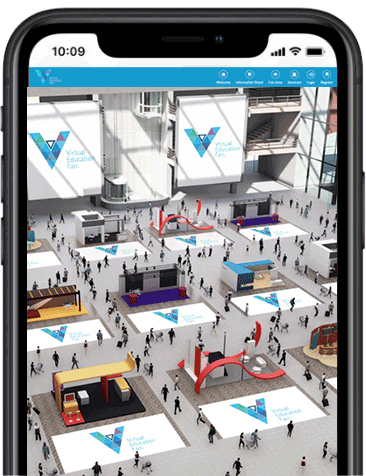Blog
Important Tips for Future Hybrid Events in 2022
The pandemic process has affected our whole lives, as we have all witnessed. However, it brought new changes to many phenomena. With the appearance of Covid-19, there have been various challenges in transitioning the events industry from a traditional meeting or conference to a virtual meeting or virtual conference for a while. In these days until 2022, have you thought about turning your upcoming face-to-face event into a mixed event by adding digital elements and what this step will provide for you? In this article, we will share with you important suggestions for the hybrid events you want to organize in 2022.
If this is your first time hosting a hybrid event, you will likely need advice on how to run a successful hybrid event. Here are some helpful tips you can apply to create online attendees, increase brand awareness, and reach your event goals.
1. Use A Reliable Event Platform.
Because of the fact that hybrid events have both physical and virtual aspects, you will need a reliable event technology platform as your remote audience will trust this technology. If you have a lot of remote attendees at your event, you need a reliable platform that can offer you all the benefits you need for a successful hybrid event. You will need a platform where you will get instant and efficient results at many points such as simultaneous live streaming of physical sessions, synchronicity between devices and smooth operation of mobile event applications.
You must be looking for an event technology platform that can seamlessly integrate virtual event and physical event components through a live stream or video upload option, live chats, lead generation and ticketing and registration systems, and an event app. You can find the opportunity to experience what you are looking for and more with the solid infrastructure of Endless Fairs. Trade shows, conventions, conferences, summits and webinars, launch, promotion days, hybrid meetings and award ceremonies, festivals, concerts and live performance events, hybrid events, virtual events and any kinds of events you need are waiting for you at Endless Fairs.
2. Ask Sponsors to Help.
Sponsors are a great way for your event brand to raise funds. However, just because they get that funding doesn't mean they don't want to help out in other ways as well. Your sponsor should be closely involved in event marketing, brand management and the overall event experience. After all, a negative attendee experience will reflect badly on them as well as your event brand, and you don't want to make a bad impression, especially if you're hosting a corporate event to impress industry competitors or peers.
Hold your sponsors accountable at this point and get them involved in other aspects of your event. This will help keep things running smoothly, help legitimize your event brand and give sponsors the maximum return on their investment.
3. Promote on Social Media.
Do not forget that social media is one of the best platforms to announce and advertise your brand before, during and after the event! Social media platforms are undoubtedly a great way to connect with your current and potential audiences. During the event, designate a team member to share live tweets at the event so people can follow developments on Twitter.
After the event, post pictures, videos and your plans for the future to keep engagement levels high. Facebook, Instagram, Twitter, YouTube and LinkedIn are the best social media platforms where you can share these. In this way, you can make people remember their experiences and share them on social media. These positive experiences multiply as you share them, and your effectiveness begins to grow by word of mouth.
4. Reorganize Your Event and Check It Again and Again.
When it is mentioned that your event will mix physical technology with advanced virtual event technology, you will likely need to understand how these technologies will work together and how your event will sustain. If you are organizing a hybrid event for the first time, we must emphasize that the logistics management in this process will be difficult. Overseeing the running of your event from the very beginning allows each server to test the equipment, navigate the virtual platform, configure how the online viewer interacts with the platform, and allow each session to flow seamlessly into the next.
Be sure to include all attendees, anyone working at the booth during a hybrid trade fairs, and anyone who may need to upload content for the digital event portion of the event. Thus, it will make everyone feel comfortable while at the same time performing the tasks necessary for their participation. It should also test components, such as how those responsible for event management will access information about attendees and live chat features.
5. Be Prepared at the Point of Lead Generation and Analytics.
If you have used online ticketing or online registration in the past, you are familiar with the software's ability to gather information about guests and provide some analytical feedback. Realize that a virtual event platform can see much more than attendees' contact information. A good virtual event platform will be able to measure attendees attending a training session, where they went to a virtual showroom, how they interacted with the keynote speaker, what event items they interacted with, and who answered. Survey questions and more services also allow you to analyze at this stage. This is very important information for presenters. Be sure to review these features prior to the event so that relevant information can be shared with sponsors and presenters.
2022 will be the year of the hybrid. How about reaching your dream events in the new year by using the latest technology products and keeping up with the needs of the age? Get ready to experience the new year hybrid with Endless Fairs. The answers to all your questions about hybrid events are in our carefully prepared blog posts. Stay tuned to Endless Fairs to discover the power of digital events. You can contact us for more information. Read more
What Are Virtual Events and How Do They Work?
Conferences, trade fairs, career fairs, and seminars are becoming popular, including in most companies and large organizations. These events can actually be seen as part of campaigns to reach a wider audience, attract job seekers, or introduce new products. However, we are all now aware of the current global situation where these events are not possible in physical environments.
For this reason, many industries have now turned to virtual events. Although physical events and conferences are a well-known method of organizing events, it is not as difficult as it seems to bring them to a virtual environment. Although it may seem difficult and complex for people who have not experienced it before, they are actually not as difficult and complex as one might think. Once you've read and learned what virtual events are and why people host them, you'll find that hosting virtual events is a very useful idea for your company.
What are Virtual Events?
Let's start with the basics first and explain what virtual events are for you in detail. A virtual event provides a platform for audiences, attendees, presenters and brands to communicate. In this environment, participants can share ideas, discuss different topics and new products, and experience virtually the same situations they experience in physical environments. The situation that arises here is actually very similar to any other physical event that a brand or organization can organize. Only these events take place online.
Virtual events can be as simple or complex as they need to be. It can be done simply through social media or through a video conferencing tool. However, if you want to show up at a career fair, trade show, or something similar, using a virtual event platform will benefit you even more.
Now let's consider a virtual trade fair. A trade fair consists of dozens of brands exhibiting their products. They present these products through live product demos or presentations. Brands can try to be more interactive and engage viewers more in their product showcases. This process can be done through live chat, Q&A sessions or even live surveys. Trade fairs are just an example for virtual events. There are many different types of virtual events that you can take advantage of. We will look at all of these in later stages.
As you probably know, exhibitors and visitors have certain expectations when they attend business, academic, or conference-style events. There has to be a sense of involvement and participation, and that's basically what a good virtual event is all about. It's not just about generating more income, it can be about building a larger and more loyal audience.
How Do Virtual Events Work?
Now we all know what virtual events are. Well, let's see how they work together. Different events such as career fairs, conferences or even open days have different needs. Your needs and goals will vary depending on the type of event you're hosting and what audience you're trying to target. However, we can review some common aspects that emerged in different virtual events.
Let's talk about the beginner level first. For this, you need video conferencing tools like Zoom, Microsoft Teams, and even live streaming services like Twitch or YouTube. Sometimes simple thinking works and allows you to focus more on your business and products than the main event. However, some events need extra tools and services. Let's look at a few features that distinguish virtual events from physical events.
What are the Features of Virtual Event Platforms?
Landing Pages
Whatever your event, whether physical or virtual, it is necessary to set up a website. If you don't want a completely separate website for the event, use a landing page for your event that works like a microsite. The landing page is the page people are directed to when they want to register for an event. People can visit this page directly or find it through your social media posts.
With a landing page, you can inform visitors about the event schedule, which brands and speakers will be available, and how to sign up. It is important to have an attractive landing page so that people are enthusiastic about the event.
On-Demand Content
A big part of what makes virtual events so popular is on-demand content. This is something you get in some degree of physical event as well. Even then, recording every moment of a physical event is incredibly difficult, as you know. This is a situation that proves that virtual events are arguably more preferable. Keynotes, presentations, demos, product demos, and more can be easily viewed during and after the event.
Live Broadcasts
Live broadcasts are essential when it comes to virtual events. Of course, you can pre-record everything and then publish it on a website or Youtube channel. However, this approach does not create the kind of personal connections a live event does. Broadcast sessions are a crucial component of hosting any virtual event.
A large event will have a large number of sessions that will work better when broadcast live. Meetings, conferences, trade shows, and other events use broadcasts to create a more interactive experience among attendees. It also makes Q&A sessions, polls, and other interaction features feel more authentic.
Customization
A good virtual event platform will allow you to customize your event to your liking. As we all know, brand image and representation mean as much or even more than actual products these days. So it would be handy to have a privileged solution. A good virtual event platform allows you to use your own brand. It allows you to include all aspects of your brand with customization. This applies to the landing page, event lobby, auditorium, exhibition stands and more. Another aspect of customization is social media integration. The impact of social media is huge and applies to every industry. When it comes to marketing and promoting the event itself, make sure the platform allows you to include social media channels.
What are the Benefits of Virtual Events?
From what we've talked about so far, virtual events bring many advantages and opportunities to most industries. It depends on what your requirements are and how well you manage to run an event. Therefore, when done properly, you can find many benefits that virtual events have to offer. We will quickly review a few of them.
Better analysis: In general, it is rather difficult for a participant to keep track of all the events they have attended within an event. Fortunately, many virtual event platforms can help you track how many times an attendee has visited a booth or attended how many sessions. This helps you assess overall engagement and participant interest.
High access: Reaching a wider audience is almost always helpful, regardless of the event. Although physical events work well in this regard, travel costs, schedule conflicts, travel restrictions, etc. You restrict some people for reasons. E.g; It is difficult for people with disabilities to participate in physical events. Hosting a virtual event allows people from anywhere in the world to easily attend your event from the comfort of their own home.
Low costs: When it comes to virtual events, resources and overall costs are saved. You won't have to worry about venue rent, equipment costs, catering costs and more. Of course, virtual events have other costs, such as the platform fee itself and a few software services you may need to purchase. However, in most cases, virtual events are more economical than physical events.t
If you want to discover the power of virtual events and take your company a few steps further from where it is, experience this experience now with Endless Fairs. Contact us now for detailed information about virtual events. Make an unforgettable event with our solid and reliable platform.
Stay tuned to Endless Fairs to learn more about virtual and hybrid fairs. Read more



